- Home
- Raymond Benson
The Rock 'n Roll Detective's Greatest Hits - A Spike Berenger Anthology Page 2
The Rock 'n Roll Detective's Greatest Hits - A Spike Berenger Anthology Read online
Page 2
“Sharp! Distance! How can the wind with so many around me?”
Jon Anderson’s soaring voice pierced the air around him as Spike Berenger finished the last of three reps of bench presses. He eased the handles to his chest and then reached for the towel that lay at his feet. The sweat might as well have been coming from the tap. He swung a leg over the bench and stood away from the Nautilus machine as the powerful rhythm section of Bill Bruford and Chris Squire blasted away on one of Berenger’s favorite Yes songs, “Heart of the Sunrise.” Music—especially loud music—certainly made a workout a much more pleasurable experience. Considering that the CD collection in the room that was a makeshift gym and recording studio was massive, Berenger was never without something to play. There were so many that if he played three CDs a day for the rest of his life, he’d never get through them all. Of course, there was no telling how long he was going to live. Once one passed the age of fifty, as he had done a couple of days ago, all bets were off.
The CD faded out with the reprise of “We Have Heaven” and one of the great Progressive Rock albums of the early seventies was over. Time for a shower and perhaps a little work.
Berenger removed the compact disc from the player and carefully replaced it in the jewel case. Hopelessly compulsive, he filed it in his collection exactly where it should go—in the fourth slot under “Yes.” All of his CDs were in alphabetical order by artist and chronological order within artist. It was the only way he could find something quickly. He knew guys that didn’t have a system and they invariably either lost or damaged their beloved discs. His son Michael liked to tease him by calling his father a Neat Freak but Berenger always countered by pointing out that he couldn’t perform his job any other way.
For Spike Berenger was a Private Investigator. A PI, a detective, a gumshoe, a private eye, a troubleshooter—whatever you wanted to call it. Sometimes he was a damned fool, too, but luckily that was a rare occurrence.
The overhead intercom clicked on and Danny Lewis asked, “Are you done playing that Prog shit in there?”
Berenger laughed. “It’s a helluva lot more interesting than the garbage you listen to, Remix.”
“I resent that remark. You know Rage Against the Machine could whip Yes’ ass anytime, anywhere.”
“We’re not talking about a street brawl, Danny, we’re talking about making music,” Berenger said.
“Yeah, right. Tryin’ to make sense out of them Yes lyrics is enough to make me wanna start a fight. Are you comin’ to work today?”
“I’m here, ain’t I?”
“You in there, sweatin’ like a motherfucker. We are in here waitin’ on your sorry ass.”
“What, you need me to give you something to do? Don’t you have that list of tasks I gave you at the beginning of the week?”
“I done all that, Spike! We’re in here twiddlin’ our thumbs!”
“All right, I’ll be in after my shower.”
“Oh, well thank God for that. We wouldn’t want you to come in before you shower.”
“Turn off the intercom, Remix.”
“Yes, sir.”
It’s too bad Rap Metal played such a huge part in Danny’s musical vocabulary, although Berenger respected that the kid was occasionally into jazz artists like John Coltrane and Miles Davis. Rap, Rap Metal, and Death Metal were not high on Berenger’s list of favorite types of music. Call him a dinosaur. He enjoyed the “classic” rock of the sixties and seventies the most. Especially Prog Rock, a style of music that was frowned upon by music critics but enjoyed by a devoted legion of fans.
Berenger went through the door that separated the studio from the inner hallway, skirted past his private office, and down to the bathroom. It was a fabulous setup on the second floor of the brownstone that was the headquarters for Rockin’ Security Inc. The ground floor contained Rudy’s office, the conference room, and other administrative offices that were primarily used to store junk. The second floor, where Berenger hung out the most, held his office, Suzanne’s office, and the studio/gym. Berenger liked to spend off-hours in the studio playing the myriad of instruments they kept on hand. Sometimes he’d roll some tape for the fun of it, especially when Charlie Potts came over and they hit a nice vibe together. The top floor was reserved for operations—the computer equipment and Danny’s hideaway was up there, along with Tommy Briggs’ office. Rudy had let Berenger have a lot of say when the building was purchased and gutted so that it could be re-designed from the inside out. Located on E. 68th Street between Third and Second Avenues, the brownstone had needed a major overhaul anyway. Rudy had sunk most of his own money into the remodeling but they had made it back within four years. Rockin’ Security was the number one security business in the world of rock music. With branches in LA and London, the firm had a database of security personnel that could be called in for a single gig or a major tour at a moment’s notice. Bodyguard service was a specialty as well. Not many people knew about the private investigation operation, which belonged exclusively to Berenger, and he was happy about that. If he had to work undercover it was best that the rock ‘n’ roll world thought of him as an expensive bodyguard rather than a PI. All in all, the partnership of Rudy Bishop and Spike Berenger worked like a dream. As long as Rudy handled the money and the dealings with Uncle Sam and let Berenger handle operations, it was the best job he could hope for. Except perhaps being a major rock star, but that prospect went out with the bath water at least two decades ago.
Berenger stripped and looked at himself in the mirror. He frowned at his bulky physique. No matter how hard he worked at it, he’d never get rid of that extra twenty-five pounds that had attached themselves to him in his forties and never let go. “Heavy set,” was how he’d characterize himself if he had to provide a description. Still, there was very little fat on his body. Most of the bulk was pure muscle. His daughter Pam once told him he looked like a wrestler. That was probably too true.
He was a rather hirsute guy as well. The long salt-and-pepper hair he had worn in a ponytail since coming out of the army reached to the middle of his back. His facial hair was slightly darker but the gray and white patches complimented his blue eyes. The carpet of thick curly chest hair was nearly all white, oddly enough. Berenger wondered why that would be the first area to grow completely middle-aged.
All in all, he was a good-looking man. At least the women he dated told him so. Of course, it had been months since he’d dated anyone, but who was counting? For a fifty-year-old, middle-aged, twenty-five pound overweight private investigator he could be a winning beau.
Berenger tried to exude sexual intensity into the mirror but ended up laughing at the absurdity of the idea. He quickly turned on the shower and got inside the stall. As the hot water washed away the sweat he thought back to the birthday party that had taken place in the studio. It hadn’t been a particularly happy occasion for him. He wanted to turn fifty about as much as a cat wants to lose its eighth life. Berenger wasn’t much of a believer in birthday parties but his staff had insisted on celebrating. They had invited his ex-wife and kids, too, and that was a little weird. Berenger loved Michael and Pam, both of them pushing the tail ends of their teens, and he still had a warm fondness for Linda, the woman he had married rather abruptly in 1984. Michael and Pam were born minutes apart in 1985 but by 1987 the marriage was kaput. Berenger just wasn’t the go-to-work-and-then-come-home kind of husband. There were too many pulls on his life and he had to satisfy each one. Apparently he hadn’t satisfied Linda’s. He had to hand it to her for not remarrying, even though she had changed her name back to Steinman.
Turning fifty was similar to turning forty, although Berenger had to admit it wasn’t as bad. This time he merely went on a three-day binge of Southern Comfort and marijuana, out from which he had decided to climb that very morning and come to work. Ten years ago he had disappeared for nearly two weeks.
That one was a hangover for the books.
Dressed and refreshed, Berenger was preparing to leav
e his private quarters and join the rest of his staff when his phone buzzed. It was Rudy, calling from the ground floor office.
“Yeah?” Berenger answered.
“Get down here,” Rudy said. “We have a client.”
“You don’t say?”
“I do say.”
“Who is it?”
“Does the name Gina Tipton mean anything to you? She’s in my outer office as we speak.”
Gina Tipton!
“Flame’s first wife?” Berenger blurted, unable to mask his amazement.
“Yeah, Flame’s first wife!” Rudy answered with enthusiasm. He obviously thought there was money to be made.
Peter Flame had been the number one topic in the music news for the past two weeks. Ever since his apparent suicide after the New York performance of his American tour, the tributes and testaments to the rock star’s life had been flooding the airwaves. Not since the death of John Lennon had the world been so mournful over a musician.
“She’s here with her lawyer,” Rudy added.
Berenger asked, “Has something happened I don’t know about?”
“Haven’t you heard the news? The police arrested Flame’s son for murder.”
“What?”
“Yeah. Can you believe that?”
“Which son?”
“Adrian.”
“I thought Flame hung himself. It was a suicide.”
“That’s what they thought at first. Now they’re saying it was murder. Last night they picked up Adrian Duncan and booked him.”
Berenger was surprised. “Well, hell, I didn’t hear that. I didn’t turn on the news today. In fact, I haven’t heard any news for the past three days.”
“So get down here.”
“I’m on my way.”
Berenger had been a fan of Flame’s and had known him personally. Berenger remembered meeting him in 1979. At that time Berenger was the tour manager for Grendel, a Prog Rock act that had been pretty big in the early seventies but was on its last legs by then. Flame was mates with Grendel’s front man and guitarist and as a favor he hired the band to support his solo tour of Europe. Berenger got to know Flame as well as anyone that summer. Later, when Flame’s Heat was back together, Berenger ran into Flame again on several occasions associated with the music business. Berenger thought Flame was a decent guy. Hell, the man was a legend, right up there with the greats. Berenger was shocked to hear of Flame’s death and couldn’t understand why he would have done it. He knew that Flame had converted to a fundamentalist religious cult at the turn of the century and that seemed to make the star appear very happy. Why would the guy kill himself? Could Flame have been despondent over the lack of success of his religious material? Berenger didn’t care much for the new stuff—he preferred Flame’s Heat material to anything else in the rocker’s career.
Still, the man was a legend. The superstar’s famous “David” stance, the one patterned after Michelangelo’s statue, was an indelible image in the annals of rock ‘n’ roll. Striking the pose was always a clue that he was about to launch into the last song of a concert. Even in recent years, Flame still had the physique for it. For a fifty-five year old rock star, he had looked damned good. Tall and lean and with his angelic shoulder-length blond hair showing no signs of graying, Flame was still a groupie’s dream.
Until now. Murder? That would certainly explain some things. Berenger had wondered if there was more to the situation than initially reported. The police had interviewed everyone associated with Flame and by all accounts the pop star was “very depressed” that night after the concert. His long-time driver had taken Flame home after the show, dropped him off around midnight, and departed. It was Kenny Franklin, Flame’s production and tour manager, who found the corpse. Berenger knew Franklin, too, and he was a real straight shooter.
Well, if it was truly murder that brought down one of the world’s biggest stars, then the week was going to shape up to be a lot more interesting than Berenger had first expected.
Berenger went down the stairs to the first floor and knocked on Rudy’s office.
“Come in,” Rudy called.
Upon entering, Berenger saw Rudy behind his desk. Seated in front of him were two people—a man in a suit, obviously the lawyer, and Gina Tipton. She turned and looked at him with those fabulous green eyes of hers and he was reminded of just how good-looking a woman she was.
“Well hi there, Spike,” she said. “Long time no see, sweetheart.”
3
LA Woman
(performed by The Doors)
Rudy Bishop blinked. “You two know each other?” he asked.
“Sure,” Berenger said. He smiled and held out his hand. “How ya doin’, Gina?”
Gina ignored his hand. Instead she stood, leaned over the back of the chair and threw her arms around his neck. “You big bear, I love you! How are you?”
Berenger kissed her cheek and gave her a squeeze in return. “I’m doing okay. You look great.”
“Yeah?” She let him go and said, “I don’t believe you. After what happened last night and this morning I probably look like shit. I sure feel like it.”
“I just heard about it, Gina.”
“Come on in and sit down, Spike,” Rudy said. He gestured to the other man, who stood and shook Berenger’s hand. “This is Derek Patterson, the attorney working for Gina and Adrian.”
The men exchanged pleasantries and then Spike sat in one of the empty chairs. Gina felt compelled to explain the familiarity to Patterson and Rudy. “Spike and I met, what, early eighties?”
“Seventy-nine, actually,” Berenger said. “Grendel supported Flame in Europe and I was their tour manager at the time.”
“That’s right! I knew it was on a tour. We had some good times, didn’t we?”
She had aged a little but she was still gorgeous and had managed to keep her figure. Blonde, with deep green eyes, Gina Tipton had been a flower child in the sixties, a rock star’s wife and a mother of a rock star’s son in the early seventies, and a party girl in the eighties. From what Berenger had heard, in the nineties she went into the business world and started selling real estate. Today she looked that part, wearing a tasteful gray suit that reminded him of Kim Novak’s wardrobe in Hitchcock’s Vertigo. Gina had cut her hair shorter and now wore it layered, just covering her ears and the back of her neck. Thin bangs hung about an inch on her forehead.
“Seventy-nine?” Patterson asked. “But you and Flame…?”
“Yeah, we were divorced,” Gina answered. “Had been for seven or eight years. Flame was married to that other harlot at the time.” She laughed to show she was kidding but Berenger knew she wasn’t.
“You and Adrian met up with us in Paris, didn’t you?” Berenger offered. “Came to the show and saw Flame backstage?”
“Yeah, wasn’t that a wonderful moment in the lives of the rich and famous? That bitch Carol threw a fit. Scared Adrian half to death. He was, what, seven? Eight? Spike here happened to step in and calm everyone down. Before you know it, he’s taking us to our hotel. The next day was your day off, wasn’t it, Spike?”
“That’s right.”
“And we toured Paris together.”
Rudy looked at him with an “Oh, I see!” expression. Berenger blushed.
“We met again in LA, gosh, a year later?” she continued.
“I think so,” Berenger said. He felt awkward with all this stuff coming out.
“We dated for six weeks,” she said, looking at Berenger out the corner of her eye. “And then he dumped me!”
Berenger cleared his throat and said, “Uhm, I seem to remember it was you that dumped me.”
“I did? Why would I want to do that?” she said playfully. “You were quite the catch.”
“Frankly, I don’t remember,” Berenger said, totally embarrassed. He couldn’t imagine how anyone could dump Gina Tipton, even Peter Flame. Berenger looked over at Rudy and saw that the forty-seven year old entrepreneur was already boppin
g in his chair. Extremely hyper, Rudy could never keep still. He was always drumming his fingers on the table or wiggling his leg or bouncing to a rhythm that only he could hear. Rudy knew the music business inside and out but he could be a maniac.
“Uhm, is this, er, history, going to affect our working together?” Rudy asked.
“Of course not!” Gina said. She looked at Berenger. “Is it?”
“Uh, no, not at all,” Berenger said. “What are we doing together?”
“I want you to clear my son,” she said. “He was arrested for murdering his father, for God’s sake.”
“I take it you believe he’s innocent?” Berenger asked.
“Of course he’s innocent!” she said indignantly. “It’s the most ridiculous thing I’ve ever heard. Someone’s trying to frame Adrian.”
Patterson spoke up. “I’m representing Adrian and we’re doing everything possible to make sure this thing doesn’t go to trial. We’d like to hire your firm to investigate Flame’s murder and at the very least come up with some other suspects that the police aren’t considering. Our goal is to get the charges dropped.”
“Where is Adrian now?” Berenger asked.
“In jail!” Gina said.
“They’re not going to let him out,” Patterson continued. “Bail has already been denied and frankly we’re not pushing for it for Adrian’s safety. There are Flame fans out there that would lynch the young man if he was seen on the street.”
“I believe it,” Berenger said. The same thing would have happened to John Lennon’s assailant back in 1980. The fans were out for blood.
“They’re transferring him to a protective custody facility at Rikers this afternoon,” the lawyer said.
“Okay, let’s start at the beginning, as they say. Tell me exactly what happened this morning.” Berenger grabbed a legal pad and pen off of Rudy’s desk and began to take notes. Rudy began to drum his fingers on the desktop, completely unaware of how annoying it was.

 The James Bond Bedside Companion
The James Bond Bedside Companion The Black Stiletto's Autograph
The Black Stiletto's Autograph Blues in the Dark
Blues in the Dark Zero Minus Ten
Zero Minus Ten The Black Stiletto
The Black Stiletto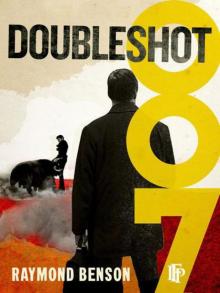 Doubleshot
Doubleshot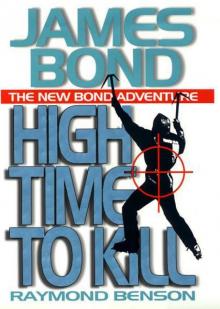 High Time To Kill rbb-3
High Time To Kill rbb-3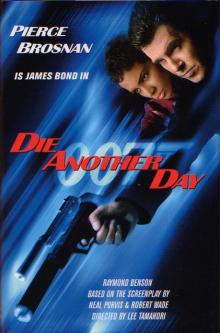 Bond Movies 07 - Die Another Day
Bond Movies 07 - Die Another Day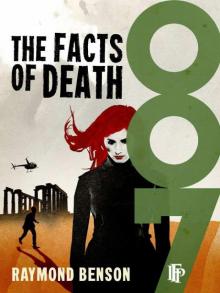 The Facts Of Death
The Facts Of Death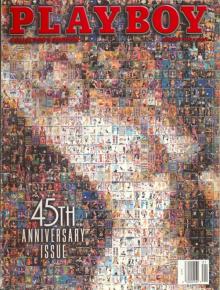 Midsummer Night's Doom
Midsummer Night's Doom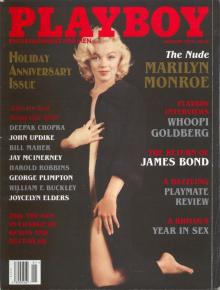 Blast from the Past
Blast from the Past The Secrets on Chicory Lane
The Secrets on Chicory Lane High Time To Kill
High Time To Kill The Black Stiletto: Black & White
The Black Stiletto: Black & White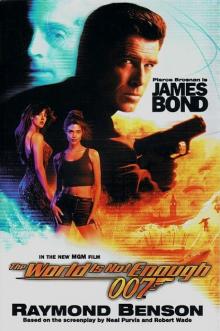 The World Is Not Enough jb-1
The World Is Not Enough jb-1 Zero Minus Ten rbb-1
Zero Minus Ten rbb-1 In the Hush of the Night
In the Hush of the Night The Black Stiletto: Stars & Stripes
The Black Stiletto: Stars & Stripes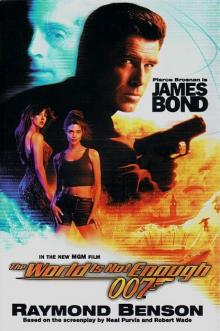 Bond Movies 06 - The World Is Not Enough
Bond Movies 06 - The World Is Not Enough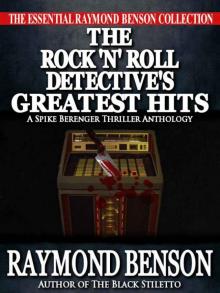 The Rock 'n Roll Detective's Greatest Hits - A Spike Berenger Anthology
The Rock 'n Roll Detective's Greatest Hits - A Spike Berenger Anthology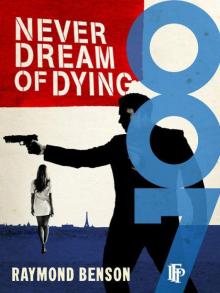 Never Dream Of Dying
Never Dream Of Dying